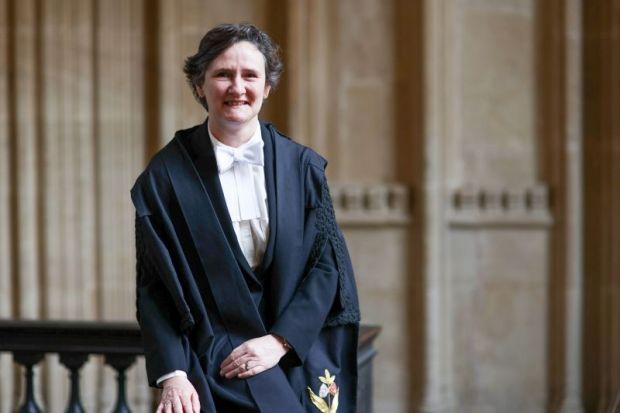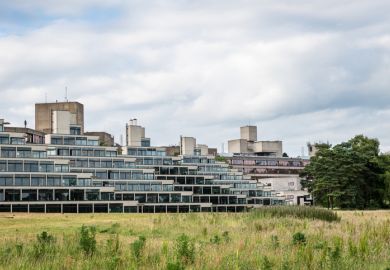Higher education staff have a “tough” job and universities should do more to help them ensure that their roles remain “tenable”, the University of Oxford’s new vice-chancellor has said, as she pledged to make staffing issues a priority of her tenure.
Giving her first speech as vice-chancellor at her admission ceremony on 10 January, Irene Tracey promised to commission an independent analysis of pay and conditions for staff at Oxford as one of her first actions in the post. This will look more broadly than the current national pay and pensions dispute, and will also consider how to ensure that staff have a good work-life balance.
“We must find ways to shift the needle in your quality of life so that you can continue to deliver your best performance,” she said, adding that she would do all she could to “support staff during these difficult financial times and [for the university] to be an attractive place to work in the future”.
Professor Tracey – a renowned neuroscientist who has spent much of her career at Oxford – said she recognised that “the job of being an internationally competitive teaching-research academic is really, really tough” and that there was a need for creative thinking “about ways to make the job tenable”.
She told Times Higher Education ahead of the speech that her predecessor, Louise Richardson, had been “fantastic” at raising funds for the university and beginning big capital projects, which she will now see through. But she felt that it was now time to focus on the “human capital side as well as the physical capital”.
“So a big arm of what I will be focusing on will be that side of it,” she said. “Which I think is right for where we are; thinking how we evolve and think more creatively about our staff – both academic and non-academic – as well as our students and what the experience is here.
“It is simple. If you haven’t got the best students coming in, the best staff working here, then you suddenly don’t become the best university.”
Professor Tracey said she specifically wanted to look at how to make the balance between research and teaching more workable, and ensure that the university was celebrating both.
“That is a really tough ask now; you are very, very highly judged on your research output, nationally and internationally,” she said. “That is where all the focus and the incentives and rewards systems are based, and yet teaching is such a rewarding thing to do and such a core part of what our mission is and such an amazing thing we contribute to the economy and the cultural richness of the country.
“We need to think smarter and better about how we reward that specifically for academics, particularly our young academics, so they feel that part of what they are doing really is championed.”
Professor Tracey – a former warden of Merton College, Oxford – said she did not feel that the university had set out to appoint an “insider” but agreed that it was an advantage that she already knew how the system works and “how to get things done”.
She said the university’s ancient college system was “a great strength of the place”, although she did not “underestimate the challenges it presents to a v-c, particularly if you are not used to it”.
“The challenge you have got is how you harness it and set collective ambitions and goals,” she added. “It works pretty well, to be honest with you – not to say there are not challenges and it doesn’t break down at times, but I do think it is core to what has kept Oxford very successful.”
Asked if the drawn-out dispute between Christ Church, Oxford, and its former dean, Martyn Percy, had undermined confidence in the system, Professor Tracey agreed that the incident had “exposed a vulnerability” that was now being looked at via various reviews, adding that she would be a “very active part of how we go forward, thinking about that and governance.”
Professor Tracey said part of the reason she was persuaded to consider the job was the national platform it provides and the chance to speak to the press and politicians “about what they want higher education to deliver for this country, what is the nature of that and how do we take it forward”.
While scrutiny and criticism was inevitable, she admitted, Professor Tracey said she felt that the country could do more to recognise the “terrific asset” that its universities are and to acknowledge that they are “something we should be very proud of”.
Oxford was top of THE’s World University Rankings for every year Professor Richardson was in charge. Professor Tracey joked that this was akin to “winning seven World Cups in a row”, and while she did not want to see academics taking an open-top bus ride just yet, she felt that the country could do more to celebrate such achievements.
Register to continue
Why register?
- Registration is free and only takes a moment
- Once registered, you can read 3 articles a month
- Sign up for our newsletter
Subscribe
Or subscribe for unlimited access to:
- Unlimited access to news, views, insights & reviews
- Digital editions
- Digital access to THE’s university and college rankings analysis
Already registered or a current subscriber? Login








